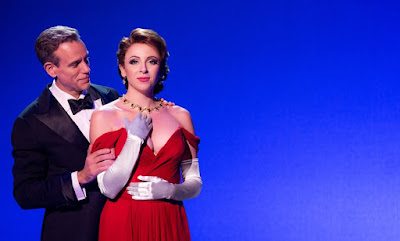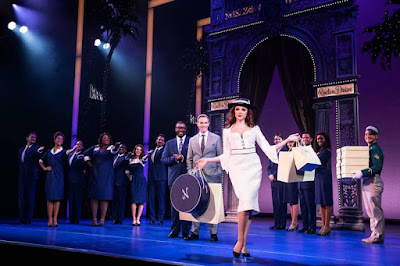By James V. Ruocco
A Cinderella tale of wealth, class, social position and prostitution, "Pretty Woman: The Musical" takes its cue from the popular 1990 motion picture of the same name and hooks itself up (no pun, intended) with plot points from "Sweet Charity," "My Fair Lady," "Gigi" and "Irma LaDouce," among others.
Not that any of that matters.
This is musical theatre - big, grand, colorful, silly, frothy, gooey, absolutely delightful.
Pretty much everyone in the audience - boys, girls, couples, homosexuals, married folk, seniors, transgenders - have seen the movie so this tale of a loveable Hollywood prostitute named Vivian who finds her "happily ever after" with Edward, a handsome millionaire who looks very much like an older version of Roger Davis from "Rent" (that's a casting coup destined to bring hundreds of diehard Rentheads to the box office) is hardly cause for alarm.
Like it, love it or hate it, a fact is a fact.
"Pretty Woman: The Musical" is fun.
It's entertaining.
It's cute.
It's harmless.
It's easy to digest.
It's irresistible.
At the same time, "Pretty Woman: The Musical" is also not going to change the world.
Nor is it going make you hop on a plane headed for Los Angeles to book a room or the penthouse suite at the Beverly Wilshire Hotel.
If you should see it - and see it you should - its "Pygmalion"-like graces and charms will definitely win you over as will its old-fashioned storyline, its Hollywood setting, its vivid, rainbow-tinged Technicolor, its lyrical musicality, its bright period costumes and its appealing, attractive characters.
In short, what's not to like?
Using a script penned by J.F. Lawton and the late Garry Marshall, "Pretty Woman: The Musical" comes to the stage with story, dialogue, characters and situations amped up or reconfigured - to some degree - for the Broadway (in this case, the National Tour) audience. As before, Vivian's accidental meeting with Edward prompts him to hire her on the spot (for a week, that is) as a paid escort to satisfy him sexually in the bedroom, dine with him at fancy restaurants, attend a performance of "La Traviata" and accompany him on heated business meetings with some very wealthy, well-dressed clients.
On film or in musical form, things move pretty fast as Lawton and Marshall go the sugar daddy route (obviously, they know what they're selling) and treat the material and its sexual subtext with abject sweetness, polish and fun-and-fancy charm and kindness while Adams and Vallance inject oiled, well-orchestrated songs into the already familiar scenario. It all comes off swimmingly (did you expect, otherwise?) as long as you succumb (this is mandatory, folks) to its decided humor, its candy-coated frivolity and the crazy conceit that sex workers are people who think big, dream big and live big - no matter what the cost.
PS: a charge card with unlimited credit for shopping sprees on Rodeo Drive (a major, plot advancing story arc that segues into song and dance) is just one of the many perks "Pretty Woman: The Musical" dishes out in playful, in-your-face abandon.
Pulled together by Jerry Mitchell, the director/choreographer who staged both the Broadway production and the current West End editon starring Aimie Atkinson and former "Hollyoaks" heartthrob Danny Mac, the National Tour is afloat with that "together forever" humor and sexiness that is gleefully pimped out for two hours and twenty minutes (much to the delight of everyone on stage and in the audience) in grand, Broadway musical fashion. Again, Mitchell holds all the cards and instills this production with a winsome capability and cheer that doesn't falter for a moment. Here, you get froth and giggle mixed with hope, thrust, good will and cookie-cutter vulnerability.
Sexually speaking, the musical is also fueled with some steamy, soft-core niceness (first and foremost, Vivian is a prostitute) that is treated openly and tastefully by Mitchell throughout both Act I and II. Edward's paid sex with Vivian includes two quickly orchestrated fade-outs of oral sex along with subsequent moments of both characters pulling off their clothes, kissing passionately and making love as the music swells and swells. Again, this isn't "The Sound of Music" or "Annie." It's a 2018 Broadway musical where the lead female character engages in sexual intercourse for pay.
That said, the story board and songbook for "Pretty Woman: The Musical" benefits from a plot line that makes great use of its ensemble cast in very much the same way as all those wonderful Broadway musicals of yesteryear did. Most of the supporting cast changes clothes, hairstyles, moods, manners and body language to morph into a variety of different characters, all of which progresses the
Pretty Woman" storyline without any blips or hiccups. As director and choreographer, Mitchell is chock full of whip-snap invention that is seamlessly cued to Hollywood Technicolor movie musical fun offset by wonderfully orchestrated production numbers mixed with hints of cuteness, flair, schmaltz, gayness and let's-applaud-this-moment showmanship. It so much fun, you can't help but lap it up like honey.
Channeling the wicked romcom nostalgia and cheerfulness of the popular 1990 Richard Gere-Julia Roberts motion picture "Pretty Woman," composer and lyricist duo Bryan Adams and Jim Vallance craft an accommodating, sweet-sounding score that pays homage, in part, to those pleasant enough Broadway musicals populated by gumdrop ditties, plausible choral numbers, bona fide solos and duets and pulse-racing production numbers that cry "showstopper," "standing o" and "gosh-oh-gee that sure is pretty." Here, you get 22 musical numbers, carefully tucked into the storyboard plotting of Act I and Act II. They are: "Welcome to Hollywood," "Anywhere But Here," "Something About Her (preamble)," "Welcome to Hollywood (reprise)," "Something About Her," "I Could Get Used to This," "Luckiest Girl in the World," "Rodeo Drive," "Anywhere But Here (reprise)," "On a Night Like Tonight," "Don't Forget to Dance," "Freedom," "You're Beautiful," "Entr'acte/Opening Act II," "This Is My Life," "Never Give Up on a Dream," "You and I," "I Can't Go Back," "Freedom (reprise)," "Long Way Home," "Together Forever" and "Finale/Oh, Pretty Woman." The latter, as most people know, was written by Roy Orbison and Bill Dees.
Every one of the songs is perfectly positioned to move the story forward with just the right amount of thread, kick and dimension to not only get you to listen - and listen well - but keep things always fun and cohesive with nary of blip, a hiccup, a jolt or a move in the wrong direction. The score, of course, is not in the same league as something by Tim Rice, Jonathan Larsen and Stephen Sondheim - "Chess," "Rent," "tick...tick...Boom!" "Company," immediately spring to mind - but, so what? There's still a massive hook to the music from melody lines and power blasts to instrumentations and lyrics that are fresh-sounding, spontaneous and inspired.
Working from the blueprint of arrangements, orchestrations and music supervision provided by Will Van Dyke, music director Daniel Klintworth ("The Book of Mormon," "Billy Elliot") brings a tremendous sense of theatricality and color to the National Tour. It's a high-octane feat of moods, flavor, flamboyance and harmonics which he and his orchestral team address with dazzle, tilt and savvy Broadway lyrical expression. Song by song, act by act, it's all vividly realized with splendid artistic freedom and comfort offset by a fingerhold that follows the musical narrative, its progression and its kaleidoscope of change intuitively. It's all expertly timed to the musical songbook at hand and the obvious, playful conceit set forth by both Adams and Vallance.
The cast - leads, supporting players and ensemble - also benefit from Klintworth's tutelage. On every level, their vocal consumption of the material is rife with a thrall and encouragement that is the music's forte. That said, the vitality of mood, swing and articulation is subsequently marked by harmonic relishing, grace and concern that is performed and negotiated with natural aplomb. The Bushnell's ideal, perfectly balanced sound system furthers that notion.
Adam Pascal, best known for his cutting-edge portrayal of Roger Davis in Jonathan Larson's 1996 Broadway production of "Rent" oozes plenty of charm, sophistication and sexiness for his role of the rich and very eligible bachelor Edward Harris. It's an emotionally engaged turn - as was Roger in "Rent" - and one Pascal coveys with honesty, passion, drive and confidence. Even when things get silly - and they do from time to time - the actor never lets his guard down for a moment. Vocally, he is magnificent (no surprise, here), displaying a wide range of emotions, style and reflection that makes every one of his musical moments ring loud and clear throughout the two-act production.
Olivia Valli, the granddaughter of "Four Seasons" frontman Frankie Valli, takes hold of the now iconic role of Vivian Ward (played by Julia Roberts in the 1990 film version of "Pretty Woman" movie) and turns it into a smart and savvy heroine who actually does get her "happily ever after" ending right before the final fadeout. She not only has great fun with the role, but invests it with a natural sense of whimsey, freedom, charm and allure. Like Pascal, she too comes to "Pretty Woman: The Musical" with vocal chops befitting a true Broadway leading lady. Her singing, which includes a powerhouse belt, is heartfelt, die-hard enthusiastic, centered and wonderfully alive.
In the role of Vivian's trusty and mouthy sidekick, Jessica Crouch delivers plenty of sass, spunk and voltage-charged vocals. Kyle Taylor Parker, cast in the dual roles of a crafty hotel manager and the show's street-singing Mr. Hollywood narrator, is an amazing talent exuding showstopping charm, personality and command throughout the musical. Lastly, there's the wonderfully animated Trent Soyster, who pretty much steals the show as Giulio, a gay Beverly Wilshire Hotel bellhop whose singing, dancing, preening, posing and frequent flights of fancy are so excitably executed and performed, his every on-stage moment, which also includes some standout ensemble work, is well worth the ovation worthy applause he gets during the musical's final curtain calls. Chock full of charm, candy store sweetness and Broadway razzle-dazzle, Soyster commands your attention from start to finish.
A crowd pleaser with nothing on its mind except to entertain, "Pretty Woman: The Musical" is a colorful, splashy entertainment that breezes along with the carefree snap and zing of a musical theatre confection designed solely to get you clapping, smiling and oh yes, put you in a romantic mood for the night, the day or the morning after (no fee required). Direction and choreography by Jerry Mitchell who helmed both the 2018 Broadway production and the London edition, currently running at the Savoy Theatre, is sweet, lively and motivated. The cast, headed by "Rent's" Adam Pascal and Olivia Valli, all deliver old-school Broadway caliber performances - the kind where every single person on stage can not only sing, dance and act, but also are in sync with the mindset and good cheer set forth by the show's creators. And that is exactly what makes this playful National Tour fly.














































